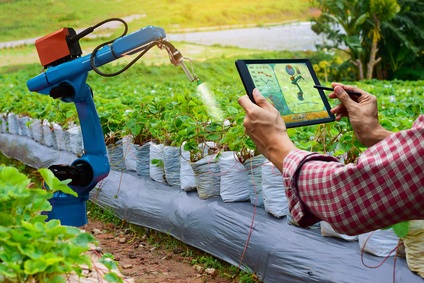Researchers studying how precision farming practices are used in Arkansas
by December 7, 2022 9:41 pm 1,267 views

Researchers wanting to know how Arkansas farmers, consultants and other professionals use precision agriculture have launched a survey to find the answers.
The survey will remain open until Jan. 31.
“This survey will help our team identify research and educational needs and priorities for precision agriculture and soil testing in Arkansas,” said Aurelie Poncet, assistant professor of precision agriculture for the University of Arkansas System Division of Agriculture. “We will use the collected information to define a common stakeholder vision for precision agriculture in Arkansas and identify some of the challenges that must be overcome to maximize benefits from technology use, soil testing, and scouting.”
Precision agriculture seeks to use new technologies to increase crop yields and profitability while lowering the levels of traditional inputs needed to grow crops (land, water, fertilizer, herbicides and insecticides), according to Sustainable America. Farmers utilizing precision agriculture are using less to grow more. GPS devices on tractors, for instance, allow farmers to plant crops in more efficient patterns and proceed from point A to point B with more precision, saving time and fuel. Fields can be leveled by lasers, which means water can be applied more efficiently and with less farm effluent running off into local streams and rivers. The result can be a boon for farmers and holds great potential for making agriculture more sustainable and increasing food availability, SA reported.
Dr. Aurelie Poncet wants to know how Arkansas farmers are using precision agriculture.
“My goal is to help Arkansas producers increase farm profitability with precision agriculture,” she said. “I am particularly interested in creating web tools that deliver data-driven recommendations proven to work under field conditions and tailored to the producers’ unique production goals, environment, and available resources.”
Working with Poncet are Don Johnson, professor in the Department of Agricultural Education, Communications and Technology, and Nathan Slaton, assistant director of the Arkansas Agricultural Experiment Station and head of the division’s soil testing lab in Marianna.
Johnson said “the results of this study will help research and extension personnel target their efforts to meet producers’ priority needs in the area of precision agriculture.”
“The questions and comments from growers and consultants are an integral part of applied research and extension programs,” Slaton said. “A large proportion of research is stimulated by problems we became aware of from interactions with growers and consultants.”
Poncet said the results of the survey will be compiled by Fall 2023.
Poncet said those answering the survey will be asked to provide their name and email address in addition to the typical demographic questions such as farm size, county, age and years of experience, but this information will only be used to identify duplicate answers. The data will be aggregated in a way to protect the participants’ identities.
